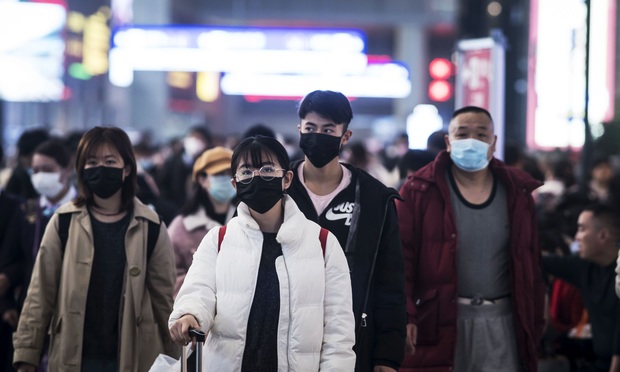General Counsel Pondering How to Handle China's Force Majeure Claims
Experts told Corporate Counsel on Wednesday that outside companies and their general counsel have three options: grant the exemption, fight the exemption in court, or try to negotiate a compromise.
February 12, 2020 at 06:10 PM
4 minute read
 Shanghai masks. Photo: Qilai Shen
Shanghai masks. Photo: Qilai Shen
As China struggles to control the impact of the coronavirus on its residents and its economy, general counsel around the world are deciding how to deal with Chinese companies that seek emergency exemptions from their contracts.
China reportedly has already certified some 100 businesses to invoke so-called force majeure exemptions from contract duties, citing the coronavirus outbreak as a qualifying disaster.
Experts told Corporate Counsel on Wednesday that outside companies and their general counsel have three options: grant the exemption, fight the exemption in court, or try to negotiate a compromise.
"I feel like I'm dealing with this [coronavirus impact] 24/7," attorney Dan Harris, of Harris Bricken in Seattle, told Corporate Counsel. "It's all-consuming." Harris had just left a client meeting where they talked of force majeure.
The term generally refers to unexpected external circumstances that prevent a party to a contract from meeting their obligations, such as delivering goods or paying invoices, among other things. With over 700 million workers ordered to stay at home, many Chinese companies are making the legal claim.
Harris, a frequent contributor to his law firm's China Law Blog, said China has always used force majeure as an easy way out of a problem. "Suing is probably not going to be the way to go," he said.
If suing in China, Harris warned, a loss is very possible. If suing in the U.S. results in a win, China "will laugh in your face" when trying to enforce the judgment.
"The best way to go is to meet with the company in China and try to convince them, with money or otherwise, to put you first on their list" once business has resumed.
In the end, Harris said, "A lot of American and European companies are going to lose a lot of money and product over this. Some companies, here and in China, are going to disappear."
Various news reports support Harris' view. China's biggest importer of liquefied natural gas, China National Offshore Oil Corp., has invoked force majeure to suspend contracts, as have several Chinese copper buyers.
Harris raised the issue of insurance. "Coverage is going to depend on individual policies," he said, "but my guess is most won't pay. They'll say this isn't force majeure."
Another expert, Mark Duedall, a partner in the Atlanta office of Bryan Cave Leighton Paisner, recently blogged that the impact of the coronavirus "and its current effects on Asian and international supply chains are unprecedented."
Duedall, who could not immediately be reached for comment, wrote, "Unfortunately, no contract clause may be less scrutinized during the drafting process than the force majeure provision."
His blog said, "If widespread disease and a resulting quarantine can disrupt your supply chain, then you need to include specific and appropriate language in the agreements with those to which you supply goods, materials, or services."
Duedall advised general counsel to "use this opportunity to figure out what you must do now on existing contracts and matters, and also what you must do in the future to improve your drafting processes, mitigate your risk, price in the risk you are actually taking, or offload your risk to third parties."
He, like Harris, also recommended checking the company's insurance policies. "Clients are routinely surprised as to coverage they thought would be there, but is not—and coverage they never thought would exist, but does," Duedall wrote.
NOT FOR REPRINT
© 2025 ALM Global, LLC, All Rights Reserved. Request academic re-use from www.copyright.com. All other uses, submit a request to [email protected]. For more information visit Asset & Logo Licensing.
You Might Like
View All
Wells Fargo and Bank of America Agree to Pay Combined $60 Million to Settle SEC Probe

Amex Latest Target as Regulators Scrutinize Whether Credit Card Issuers Deliver on Rewards Promises

MLB's Texas Rangers Search for a New GC and a Broadcasting Deal

Survey Finds Majority of Legal Professionals Still Intimidated by AI Despite Need to Streamline Mounting Caseloads
Law Firms Mentioned
Trending Stories
- 1SDNY Criminal Division Deputy Chief Returns to Debevoise
- 2Brownstein Adds Former Interior Secretary, Offering 'Strategic Counsel' During New Trump Term
- 3Tragedy on I-95: Florida Lawsuit Against Horizon Freight System Could Set New Precedent in Crash Cases
- 4Weil, Loading Up on More Regulatory Talent, Adds SEC Asset Management Co-Chief
- 5Big Banks Did Great Last Year. What Does That Mean for Big Law?
Who Got The Work
J. Brugh Lower of Gibbons has entered an appearance for industrial equipment supplier Devco Corporation in a pending trademark infringement lawsuit. The suit, accusing the defendant of selling knock-off Graco products, was filed Dec. 18 in New Jersey District Court by Rivkin Radler on behalf of Graco Inc. and Graco Minnesota. The case, assigned to U.S. District Judge Zahid N. Quraishi, is 3:24-cv-11294, Graco Inc. et al v. Devco Corporation.
Who Got The Work
Rebecca Maller-Stein and Kent A. Yalowitz of Arnold & Porter Kaye Scholer have entered their appearances for Hanaco Venture Capital and its executives, Lior Prosor and David Frankel, in a pending securities lawsuit. The action, filed on Dec. 24 in New York Southern District Court by Zell, Aron & Co. on behalf of Goldeneye Advisors, accuses the defendants of negligently and fraudulently managing the plaintiff's $1 million investment. The case, assigned to U.S. District Judge Vernon S. Broderick, is 1:24-cv-09918, Goldeneye Advisors, LLC v. Hanaco Venture Capital, Ltd. et al.
Who Got The Work
Attorneys from A&O Shearman has stepped in as defense counsel for Toronto-Dominion Bank and other defendants in a pending securities class action. The suit, filed Dec. 11 in New York Southern District Court by Bleichmar Fonti & Auld, accuses the defendants of concealing the bank's 'pervasive' deficiencies in regards to its compliance with the Bank Secrecy Act and the quality of its anti-money laundering controls. The case, assigned to U.S. District Judge Arun Subramanian, is 1:24-cv-09445, Gonzalez v. The Toronto-Dominion Bank et al.
Who Got The Work
Crown Castle International, a Pennsylvania company providing shared communications infrastructure, has turned to Luke D. Wolf of Gordon Rees Scully Mansukhani to fend off a pending breach-of-contract lawsuit. The court action, filed Nov. 25 in Michigan Eastern District Court by Hooper Hathaway PC on behalf of The Town Residences LLC, accuses Crown Castle of failing to transfer approximately $30,000 in utility payments from T-Mobile in breach of a roof-top lease and assignment agreement. The case, assigned to U.S. District Judge Susan K. Declercq, is 2:24-cv-13131, The Town Residences LLC v. T-Mobile US, Inc. et al.
Who Got The Work
Wilfred P. Coronato and Daniel M. Schwartz of McCarter & English have stepped in as defense counsel to Electrolux Home Products Inc. in a pending product liability lawsuit. The court action, filed Nov. 26 in New York Eastern District Court by Poulos Lopiccolo PC and Nagel Rice LLP on behalf of David Stern, alleges that the defendant's refrigerators’ drawers and shelving repeatedly break and fall apart within months after purchase. The case, assigned to U.S. District Judge Joan M. Azrack, is 2:24-cv-08204, Stern v. Electrolux Home Products, Inc.
Featured Firms
Law Offices of Gary Martin Hays & Associates, P.C.
(470) 294-1674
Law Offices of Mark E. Salomone
(857) 444-6468
Smith & Hassler
(713) 739-1250






